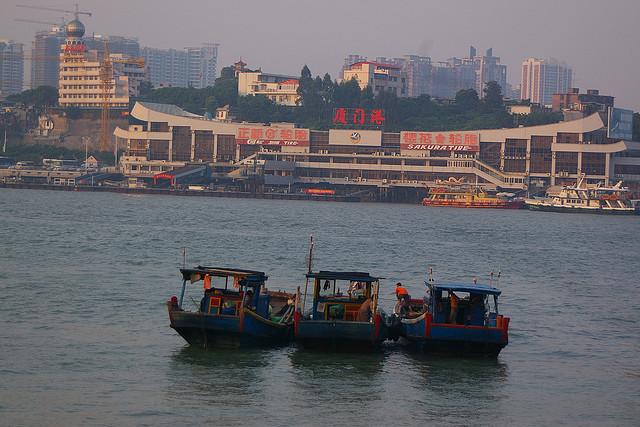Reader response: control and diplomacy
Posted By Malcolm Cook on February 15, 2013 @ 13:15
 [1]
[1]Brendan Taylor provides an eloquent critique [2] of Ben Scheer’s recent post [3], but I don’t think I can agree with him.
In his desire to ‘soften’ his former colleague’s line on China’s recent actions in the territorial dispute with Japan, he misses the most worrying element of his alternative anti-monolithic view of China in line with Linda Jakobson’s recent Lowy paper [4]. This very element might well rule out the creative diplomatic options Brendan teases us with but does not elaborate on.
Following that logic, China’s most senior political leaders might not know what armed agents of the Chinese state are doing and are unable or unwilling to reign them in once they find out. This is a more worrying scenario for us all than the ‘monolithic complex strategy following China’ that Brendan claims Ben presents. Even more worrying is Linda’s final point that this lack of control is inherent to the present Chinese political system.
The upsurge in China–Japan tensions over the last decade is consistent with the uncontrolled thesis, as it is Chinese armed state agents that have come the closest to triggering an incident at sea (a ‘Tuchman miscalculation’), with Chinese helicopters and fighter jets ‘buzzing’ Japanese forces [5], PLAN radars locking onto Japanese platforms in disputed waters [6] and PLAN flotillas sailing through the Miyako strait [7] with no prior warning. Seemingly none of the perpetrators of these unprecedented and dangerous acts have faced sanctions from their political seniors. This wouldn’t and couldn’t happen in Japan, Australia or the United States and it shows how far the situation may be from creative diplomatic solutions.
It’s feasible that a major reason that Xi Jinping is now heading a Diaoyu crisis office [8] is that the uncontrolled actions associated with this dispute and the international criticism of China that they have triggered have finally caught the attention of the domestically pre-occupied leadership. The key next step is to use the elevation of the dispute to a crisis in China to press the Chinese leadership to gain greater control over the armed agents of the Chinese state. This would seem to be a good pre-condition for feasible creative diplomatic options that would likely require the policy predictability that comes with top-down control.
Continued firm Japanese responses to such uncontrolled actions with support from the region and the United States could be the best way to achieve this, particularly as Japanese responses to date have been quite restrained. I’m sure the Vietnamese fishers routinely arrested by Chinese armed agents in the South China Sea sans collisions wouldn’t see the arrest of the Chinese trawler crew that crashed into the Japanese Coast Guard ship and their quick release in 2010 [9] as much of a step towards any brink.
By changing the domestic cost-benefit analysis, Gaiatsu (foreign pressure) has long facilitated desired domestic reforms hitherto blocked by vested interests below the senior political leadership and a lack of central control in Japan. It’s hoped that China’s senior leadership desires greater control over the armed agents of the Chinese state. Continued foreign pressure against uncontrolled actions by those agents could well advance this hope.
Malcolm Cook is dean of the School of International Studies, Flinders University and non-resident fellow at the Lowy Institute for International Policy. Image courtesy of Flickr user tim.md [10].
Article printed from The Strategist: https://aspistrategist.ru
URL to article: /reader-response-another-vote-for-a-firm-response/
URLs in this post:
[1] Image: https://aspistrategist.ru/wp-content/uploads/2013/02/1668103581_934e3b7fff_z.jpg
[2] eloquent critique: https://aspistrategist.ru/reader-response-china-and-japan-lets-take-a-step-back-from-the-brink/
[3] recent post: https://aspistrategist.ru/chinas-dangerous-brinkmanship-in-maritime-northeast-asia/http:/www.aspistrategist.ru/chinas-dangerous-brinkmanship-in-maritime-northeast-asia/
[4] recent Lowy paper: http://www.lowyinstitute.org/publications/chinas-foreign-policy-dilemma
[5] Chinese helicopters and fighter jets ‘buzzing’ Japanese forces: http://ajw.asahi.com/article/views/column/AJ201208230015
[6] PLAN radars locking onto Japanese platforms in disputed waters: http://www.businessinsider.com/china-locked-on-japanese-vessel-diaoyu-senkaku-disputed-islands-2013-2
[7] PLAN flotillas sailing through the Miyako strait: http://english.peopledaily.com.cn/90786/8053459.html
[8] heading a Diaoyu crisis office: http://thediplomat.com/2013/02/08/how-involved-is-xi-jinping-in-the-diaoyu-crisis-3/
[9] arrest of the Chinese trawler crew that crashed into the Japanese Coast Guard ship and their quick release in 2010: http://news.smh.com.au/breaking-news-world/chinajapan-row-boils-despite-crew-release-20100913-158gh.html
[10] tim.md: http://www.flickr.com/photos/ships-worldwide/1668103581/
Click here to print.